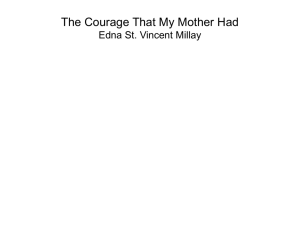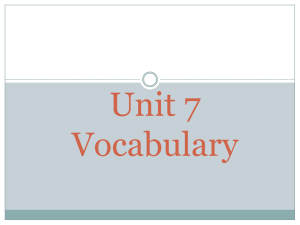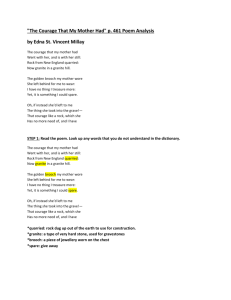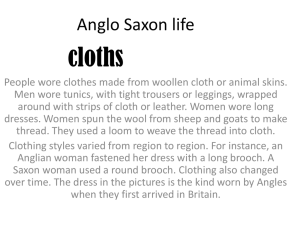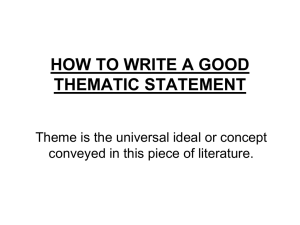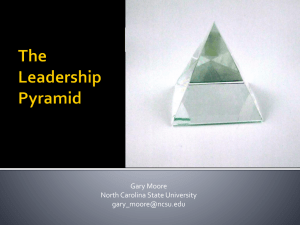CahseeLiteraryResponse - San Fernando Senior High School
advertisement
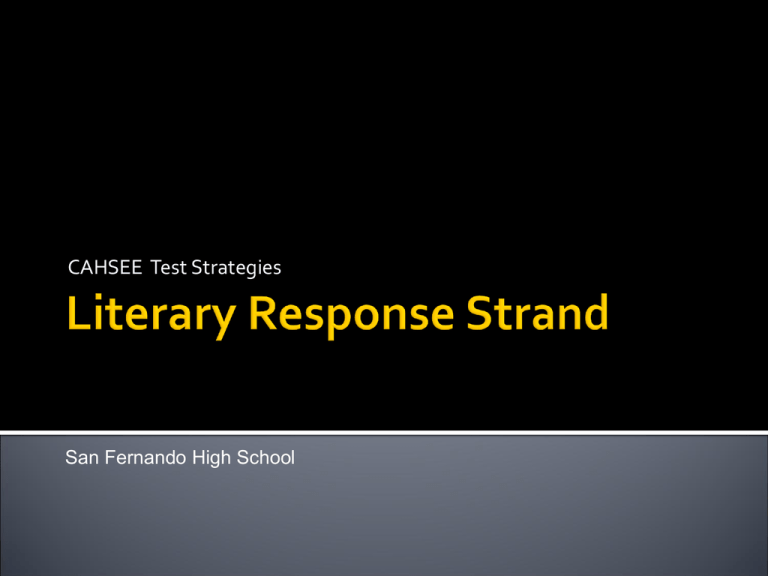
CAHSEE Test Strategies San Fernando High School The Literary Response strand is the longest section of the test with 20 multiple-choice questions. You will be asked questions about literary devices, figurative language, character traits, conflicts, and themes. You know…that stuff you talk about every day in English class! The California response to literature standards include your ability to think and write about: Genres (types) of literature Figurative language and literary devices Characters, their traits and conflicts How a piece of literature reflects an author’s culture and historical period You should be able to identify different literary genres (types), such as: Autobiography (account of person’s life told by that person) Poetry Drama (Plays) Essay Fiction (Novels, Short Stories) You should be able to identify elements in literature such as: Metaphor Simile Personification Symbolism Irony Theme Mood Tone Making a comparison between two UNLIKE things, using the words “like” or “as” “I love you like a fat kid loves cake” “I’m as blind as a bat” What two things are being compared in these similes? Making a comparison between two UNLIKE things WITHOUT using the words “like” or “as” “You are my sunshine” “Life is a rollercoaster” “America is a melting pot” What two unlike things are being compared in these quotes? A comparison between two things that seem dissimilar, in order to show the ways that they might be similar. Is to AS Is to “A bald spot is like a lie, the bigger it gets the harder it is to cover it up.” “A bird is to nest as a bee is to …?” Giving human qualities to an animal, thing, or idea. They must be human qualities-can humans fly? The telephone screamed to be answered. The door flew open. The birds shouted their songs. The chair ran as I tried to sit. An idiom is a figurative, sometimes strange, expression that cannot be understood if taken literally. Idioms are usually cultural specific English idioms: “It’s raining cats and dogs” “The test will be a piece of cake” “She decided to quit cold turkey” Spanish idioms: Ojos que no ven, corazon que no siente Aunque la mona se vista de seda, mona se queda You should be able to identify: Character traits (direct and indirect) Conflicts (internal and external) Motivations Relationships between characters Finally, you should be able to identify how a piece of literature reflects the authors: Culture Style Historical period Read the following poem: Now answer this question: The Courage That My Mother Had The courage that my mother had Went with her, and is with her still: Rock from New England quarried; Now granite in a granite hill. Which sentence BEST describes the theme of this poem? The golden brooch my mother wore She left behind for me to wear; I have no thing I treasure more: Yet it is something I could spare. B Only a daughter can truly relate to her mother’s feelings. Oh, if instead she’d left to me The thing she took into the grave!— That courage like a rock, which she Has no more need of, and I have. A Personal strengths are more important than valuable objects. C Having a golden brooch is better than nothing. D Unlike jewelry, traits such as courage are not valued. Remember that the theme is the dominant idea running through the passage. Also pay attention to key words such as “I could spare” and “if instead.” Although all four options are themes, some options do not pertain to the passage. Which sentence BEST describes the theme of this poem? A Personal strengths are more important than valuable objects. B Only a daughter can truly relate to her mother’s feelings. C Having a golden brooch is better than nothing. D Unlike jewelry, traits such as courage are not valued. The Courage That My Mother Had The courage that my mother had Went with her, and is with her still: Rock from New England quarried; Now granite in a granite hill. Next question: Which phrase from the poem creates a tone of sadness and regret? A “Rock from New England quarried” The golden brooch my mother wore She left behind for me to wear; I have no thing I treasure more: Yet it is something I could spare. B “Oh, if instead she’d left to me” Oh, if instead she’d left to me The thing she took into the grave!— That courage like a rock, which she Has no more need of, and I have. D “That courage like a rock” C “The golden brooch my mother wore” In this question, you need to look for clue words that indicate tone, in this case a tone of sadness and regret. The words that indicate regret are “Oh, if instead.” Which phrase from the poem creates a tone of sadness and regret? A “Rock from New England quarried” B “Oh, if instead she’d left to me” C “The golden brooch my mother wore” D “That courage like a rock” The Courage That My Mother Had The courage that my mother had Went with her, and is with her still: Rock from New England quarried; Now granite in a granite hill. The golden brooch my mother wore She left behind for me to wear; I have no thing I treasure more: Yet it is something I could spare. Oh, if instead she’d left to me The thing she took into the grave!— That courage like a rock, which she Has no more need of, and I have. Next question: Which pair of nouns BEST describes the mood of this poem? A admiration and longing B distrust and jealousy C awe and amazement D anger and resentment Remember that tone is the author’s attitude toward the subject, while mood is the atmosphere of the poem. While the author’s tone is one of sadness and regret, the mood of the poem is one of admiration for the mother and longing to be like her. Which pair of nouns BEST describes the mood of this poem? A admiration and longing B distrust and jealousy C awe and amazement D anger and resentment The Courage That My Mother Had The courage that my mother had Went with her, and is with her still: Rock from New England quarried; Now granite in a granite hill. The golden brooch my mother wore She left behind for me to wear; I have no thing I treasure more: Yet it is something I could spare. Oh, if instead she’d left to me The thing she took into the grave!— That courage like a rock, which she Has no more need of, and I have. Next question: Which form of figurative language is the phrase “That courage like a rock?” A metaphor B irony C personification D simile A simile is a comparison of two things using like or as. The poem compares the mother’s courage to a rock using the word “like.” This is clearly a simile. Which form of figurative language is the phrase “That courage like a rock?” A metaphor B irony C personification D simile
